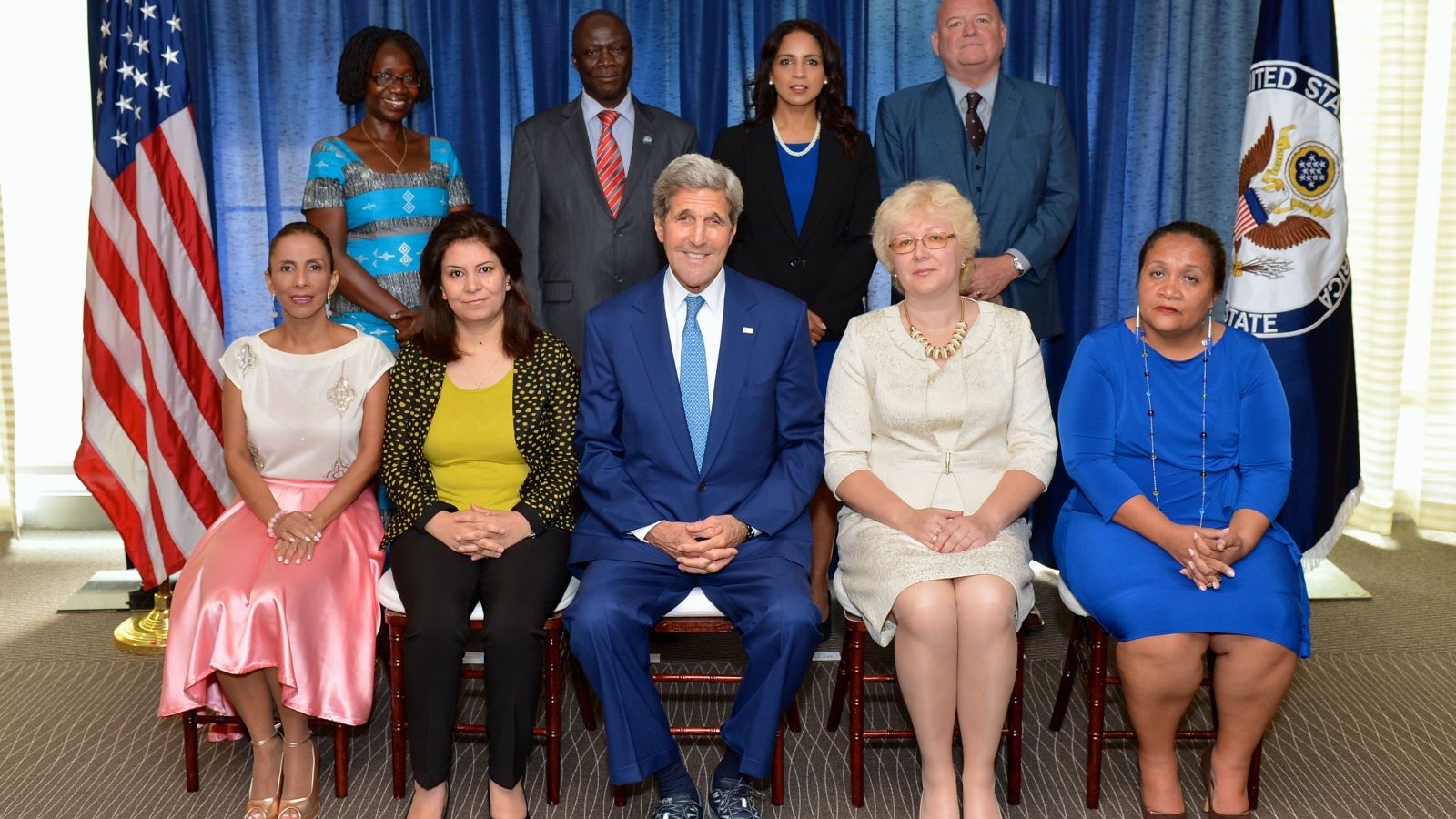John Kerry takes picture with 2015 TIP Report Heroes at report’s launch July 27, 2015.
By Liza Kane-Hartnett
With an estimated 20 million victims, and $150 million in profits human trafficking is a global crisis. During a briefing and discussion on the 2015 Trafficking in Persons (TIP) Report, newly confirmed ambassadors, Ambassador Sarah Mendelson and Ambassador-at-Large Susan Coppedge, consistently spoke to the United States’ leadership in combatting trafficking on the global level and its use of the report to effectively rank individual nations‘ anti-trafficking policies. While the U.S. continues to lead the world in combatting human trafficking and the TIP Report is widely respected, reforms to improve transparency in the report’s process are needed to ensure the its long-term political independence and credibility.
Produced by the U.S. Department of State, the TIP Report is a comprehensive overview of governmental efforts to address human trafficking all over the world. Ranking countries in four tiers (featuring both a ‘Tier 2,’ and ‘Tier 2 Watch List’), the report classifies states based on governmental anti-trafficking efforts and impacts. The U.S. uses the TIP Report as its diplomatic tool and primary leverage point in foreign policy discussions concerning human trafficking with the aim of strengthening the three P’s: prosecution, protection, and prevention. Countries receiving a Tier 3 ranking (the worst) are subjected to restrictions on non-humanitarian assistance and aid in addition to naming and shaming.
While the report serves as a symbol of U.S. commitment to combat human trafficking, it has quite a history of controversy. This year’s report was overshadowed by charges that senior State Department officials, accounting for broader U.S. foreign policy interests, altered rankings by improving the status of Malaysia, Cuba, China, and other strategic nations.
To the credit of critics, these rankings can be easily politicized, as Annick Febrey of Human Rights First explains: “Although the TIP office spends most of the year researching and developing the recommended rankings, the final decisions must go through senior diplomatic levels” of the Department of State’s hierarchy. The apparent campaigning of high-level diplomats for the re-ranking of specific countries diminishes the report’s credibility and raises questions about the sincerity of U.S. anti-trafficking efforts in line with other global priorities. The only mention of controversy at last week’s event was a question posed by an audience member that was effectively sided stepped by ambassadors who brought the conversation back to the report’s impact and the U.S.’ commitment to the issue.
Although this year’s controversy is more public than usual — as Febrey explains, “it is not often that so many politics appear to be in play with the rankings”— there are always political elements in the report. For example, questions concerning the report’s evaluation criteria and methodology, judgment of the U.S.’ own efforts and policies, and reliance on U.S. standards, among others, have served as the foremost critiques of the TIP Report’s integrity and effectiveness since its inaugural publication in 2001. David Esarey, Senior Associate at the Human Trafficking Center, highlights controversies such as Colin Powell exerting influence on Haiti’s 2003 ranking to demonstrate the pervasiveness of politics in the TIP ranking system despite assertions contending otherwise by the U.S. Department of State.
Ultimately, the report’s impact is dependent on its credibility and the desire of governments to be seen as active participants in the fight against trafficking. Yet if the report is viewed more as a political tool than an objective one, the willingness of governments to share information and work alongside U.S. authorities for improvement in anti-trafficking policies may decline. Conversely, the report’s weaknesses stem from its inability to acknowledge its bias. As a publication of the U.S. Department of State, the TIP Report does not operate in a vacuum separate of other U.S. foreign policy concerns and cannot be independent. Through an acknowledgement of the report’s political nature and a detailed description of its criteria and methodology, the State Department can begin to improve the report’s transparency and thus its credibility.
As a means of increasing independence and thus objectivity, Febrey speaks to the importance of leadership: “It’s important to have a strong leader heading up the TIP office while the report is being finalized. That post was open for 10 months last year, all through the report-writing period, which is problematic.” She continues by arguing that “it would help to appoint a senior White House staffer who would coordinate and implement a national strategy for combating trafficking, and be responsible for ensuring that trafficking is a priority at the highest level of decision making in the administration and in bilateral relationships with foreign governments at all times.”
The presence of a high-level project leader could provide greater leverage in future ranking disputes with top State Department officials. Although improved leadership has the potential to increase independence, greater transparency is ultimately needed to ensure the report’s longevity and credibility. Among other measures, a stronger methodology section that details the research and ranking processes, evaluation criteria, and data inconsistencies would firmly establish the report’s objectivity, and therefore its agency to engage governments and improve anti-trafficking policies.
*****
*****
Liza Kane-Hartnett is an editorial assistant at the World Policy Journal.
[Photo courtesy of U.S. Department of State]
